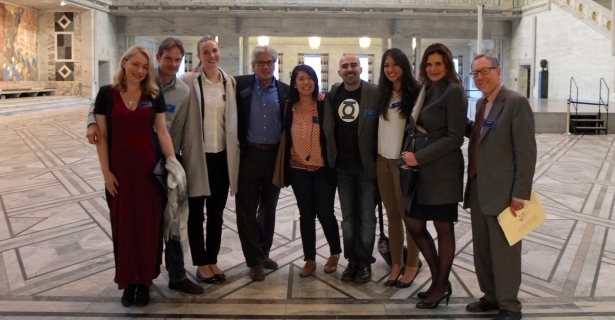Oslo Freedom Forum video made by Benya!
The theme of "Catalyst" could not be more appropriate of a word to describe the purpose and impact of this year's Oslo Freedom Forum.
Spending three days listening to, eating next to, and connecting with human rights defenders, tech and social entrepreneurs, journalists, and government officials from around the world almost feels surreal. However, when Rachana Sunar, the Nepalese women's rights activist who discusses the implications of child marriage to young girls in her community, grabs my hand and calls me her sister -- nothing felt more real.
Indeed, we are sisters. Through the art of storytelling, hundreds of us from around the world were able to share in one another's catalytic experiences. As Kimberly Motley spoke about her pro bono work as an attorney for Afghan women during the "Women in Law" panel, her passions for women's empowerment, law, and criminal justice catalyzed my own. I sat in the audience, about to burst from my seat with the chemical excitement broiling inside me from listening to a woman whose footsteps I would love to follow.
At these big forums, there is undoubtedly a lot of pressure to "network," an expectation of trading business cards for future opportunities. However, networking and connecting are not always one in the same. For me, as necessary as the former may be, the latter was the crux and the most important part of my experience at the 2016 Oslo Freedom Forum.
I met Suleiman Bakhit, a Jordanian activist well renowned in the counter-terrorism field, who inspires Jordanian youth across the country with his comics that offer an alternative source of heroism for those who might otherwise turn towards more violent examples of role models. The catalyst for his work was a question he asked a kindergarten classroom of Jordanian students: "Who is your hero?" That one question catapulted him to a hero status of his own, working tirelessly to get his comics into Jordanian textbooks, as well as setting up a foundation in Jordan where he grants wishes to terminally ill children. Over dinner and hours of discussion outside a café in central Oslo, he shared with me the stories that sparked his catalytic impact. He then spun the tables, asking me a question whose answers continue to leave a compounding effect on me.
"Did you read stories as a kid?" he asked.
Yes, I read a lot of stories as a kid. In the first grade, I won a Baskin Robins gift card from my town library for reading the greatest number of books in town. In fact, I even wrote my own stories growing up.
"What stories did you write?" Suleiman asked me.
My stories always had heroic plot lines, such as my personal favorite, "When Lima Beans Attack," where the protagonist defended the world against a lima bean invasion by realizing that these neglected beans really just wanted love, not vengeance.
I realized, however, that while I always imagined the main protagonist being myself, I rarely ever had a female protagonist. And when I did, she would always be White with blue eyes and blonde hair -- sometimes brown -- and her name would always be Samantha or Jessica. Nowhere in my stories did my characters reflect my own identity as a bi-racial Thai American woman, or the complexities of growing up in both societies, or the impact that the intersections of masculinity, race, mental illness, and violence have had on my family.
His questions made me wonder, what stories am I telling about myself? What stories am I telling about my communities? What stories are driving who I am and what I do?
Sharmeen Obaid-Chinoy, a two-time Oscar winner, uses documentary filmmaking to tell the stories of violence against women in her country of Pakistan. Shui-Meng Ng tells the story of her husband's forced disappearance in Laos, using her narrative to spark a dialogue on the continued impunity of many southeast Asian governments. Cuban art activist, El Sexto, painted stories on his body to expose the repression of the Cuban regime. Abdalaziz Alhamza uses citizen journalism to expose his communities to the terror tactics of ISIS in Syria. Over coffee, Kenzi Connor, president and founder of Cloud City Development, shares her personal story as a trans-woman pioneering the tech industry. Bradley Myles, CEO of Polaris, uses data and technology to expose the prevalence of human trafficking and to amplify the stories of trafficked voices.
I feel so privileged to have had the opportunity to listen to all these stories, all these voices that are breaking some of the toughest of silences. While I'm glad to have left with a purse-full of business cards, the most meaningful thing these speakers and activists gave me was the opportunity to think about how I, too, can use my voice and my stories to catalyze change.
And that's something no business card can give you.

